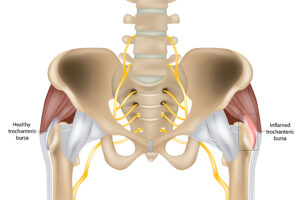Hip Bursitis Treatment in Arlington, VA

Bursae are small, gel-filled sacs located near joints throughout the body. Positioned between bones and soft tissues, the bursae serve as friction-reducing cushions during movement.
Bursitis of the hip develops when a bursa in the hip joint becomes irritated and inflamed due to sudden trauma or repetitive stress, which can occur during activities such as long-distance running. Two major bursae in the hip are prone to bursitis: the greater trochanter bursa at the bony point of the hip and the iliopsoas bursa on the groin side of the hip. Trochanteric bursitis is more common, and both types are treated similarly.
What Are the Signs of Bursitis of the Hip?
The most common symptom of trochanteric bursitis is pain that extends from the point of the hip to the outer thigh. The pain may be sharp and intense at first, then later settle into a dull ache. Iliopsoas bursitis can cause pain and tenderness that radiate from the groin through the front of the hip and down the thigh.
Hip bursitis pain may worsen at night, when lying on the affected hip and when rising from a seated position. It also may also worsen after prolonged walking, stair climbing or squatting.
To diagnose bursitis of the hip, a physician will typically perform a physical examination and check for tenderness at the point of the hip. If needed to rule out a fracture or another injury, the physician may order an X-ray, bone scan or magnetic resonance imaging (MRI) scan.
How Is Bursitis of the Hip Treated?
In many cases, hip bursitis symptoms improve with conservative treatments, such as activity modifications, nonsteroidal anti-inflammatory drugs (NSAIDs) and the use of an assistive walking device, such as a cane or crutches, when needed. Physical therapy can help stretch the iliotibial (IT) band and increase hip strength and flexibility.
To address severe hip bursitis symptoms, a physician may suggest a corticosteroid injection into the affected bursa, which can reduce painful inflammation for up to several months. If the symptoms recur, a second injection may be considered.
Hip bursitis rarely requires surgery. However, if the affected bursa remains painfully inflamed after several months of conservative treatment, a physician may suggest surgically removing it, which will not affect hip function.
See a Hip Specialist in Arlington
If you have symptoms of hip bursitis, you can consult with a hip specialist at Nirschl Orthopaedic Center in Arlington, VA. Contact us at (703) 525-2200 today to request an appointment.
